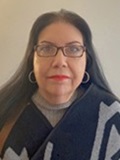Federal Policies and Structural Inequities in American Indian Health
Webinar Details
American Indians and Alaska Natives (AIAN) are the ‘unseen’ populations in the US. Americans know very little about the people Indigenous to North America, and it has been by design. The Health Professions education, research, and practice often rely on the asterisk as a placeholder in lieu of this missing information (Shotton, H., Lowe, S., & Waterman, S., 2023). This leaves the AIAN patient population with less than inadequate care and outcomes. Native faculty, staff, students, and patients can feel like they are ‘infiltrating’ institutions not designed for them or, in fact, designed in ways that constructively keep them out. The Future of Nursing reports were the seminal reports for the profession moving forward, with the first in 2010 being the most downloaded IOM (now NAM) report. The first Future of Nursing Report had two mentions of AIAN, and the current Report has less than one page focused on AIAN in a 500-page report. AIAN shares all the same issues, barriers, and systemic racism as other BIPOC groups, but as partially sovereign nations within the US, they have legal, geopolitical, and land-based issues none of the other groups have. To reach real solutions, there must be persistent, sustained, adequate, system-wide education on this very specific population for nursing and beyond.
Objectives:
- Recognize the impact of past and present federal legislation on the health and wellbeing of Indigenous communities.
- Describe the health disparities impacting American Indian and Alaska Native populations and their policy origins.
- Demonstrate best practices for allyship to Indigenous communities as a healthcare provider.
Note: Recording of the webinar will be available soon after the webinar airs. Visit AACN's On-Demand Webinars to watch.
Speakers

Margaret P. Moss, PhD, JD, RN, FAAN
Professor and Associate Dean for Nursing and Health Policy
Katherine R. & C. Walton Lillehei Chair in Nursing Leadership
University of Minnesota School of Nursing
Dr. Margaret Moss is an enrolled member of the Mandan, Hidatsa, and Arikara Nation in North Dakota. She is the first and only American Indian to hold both Nursing and Juris Doctorates. She has been a nurse for 35 years and an academic for 24 years across 4 universities including the University of Minnesota (twice) where she has returned as Professor in Nursing and Associate Dean of Nursing and Health Policy, Yale University, SUNY Buffalo and the University of British Columbia (UBC). Just prior she was at UBC 2018-2023, as a Professor, School of Nursing, Interim Associate Vice President Equity & Inclusion for the University, and Director of the UBC First Nations House of Learning, a strategic Indigenous leadership position under the Provost. She co-led the development and launch of the UBC Indigenous Strategic Plan (2020) one of the only comprehensive plans in No. America. Dr. Moss was named to the inaugural Forbes 50 over 50 Impact List, 2021. She was elected to the American Academy of Nursing’s Board 2021 and has been elected a member of the National Academy of Medicine (NAM) (2022). She sits on a Board of the National Academies of Sciences, Engineering and Medicine. She has contributed to 2 NAM consensus studies- Federal Policy to Advance Racial, Ethnic, and Tribal Health Equity (2022), and currently The Use of Race and Ethnicity in Biomedical Research. Dr. Moss wrote an award-winning text, American Indian Health and Nursing (2015) followed by Health Equity and Nursing (2020). In other experiences, Dr. Moss was a RWJF Health Policy Fellow and staffed the Senate Special Committee on Aging. She was a Fulbright Research Chair at McGill University on Indigenous Life Across the North American Context. She is asked to speak often on Indigenous, health, aging, diversity and policy issues with academics, health professionals and other groups nationally and internationally.
Pricing and CE Credit
This webinar is free to deans, faculty, staff and students from AACN member schools of nursing. All non-member audiences will be required to pay a $59 webinar fee.
Continuing Education Credits
 The American Association of Colleges of Nursing is accredited as a provider of nursing continuing professional development by the American Nurses Credentialing Center’s Commission on Accreditation.
The American Association of Colleges of Nursing is accredited as a provider of nursing continuing professional development by the American Nurses Credentialing Center’s Commission on Accreditation.
